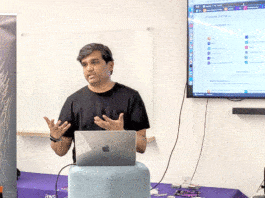What role does open source play in the overall Oracle game?
Well, we are clearly known as a private source company— the word ‘proprietary’ seems too harsh to us. I also think the term ‘open source’ is too big for us. We don’t think that there is just ‘one’ open source community any more. Back in the days when it was very specific, all the open source communities were pretty similar. Now you’ve got very large corporations such as Oracle and IBM that have done some massive things in many different areas. Open source has diversified so much that we cannot refer to something as “the open source community” any more.
We evaluate open source projects based on our contribution to them or their usage. There can be some projects that we adopt; some that we will adopt and integrate; some that we will adopt, integrate and then contribute to; and there will be those for which we will take money and then provide support. So, each individual project has different levels of commitment from our perspective, and then we evaluate them on a case-by-case basis.
How has the feedback been, considering Oracle chose to base its enterprise Linux distribution on RHEL?
Customers look for a single-solution support vendor, and if they get everything from one vendor, it is magic.
The enterprise customers want one version of Linux so that there is hardware and software compatibility. Our approach is to offer enterprise customers the entire stack and not just one component of that stack. At Oracle, what we do is called validate configurations, which includes storage, servers, database applications and, obviously, operation system versions.
When customers come to us and ask for an ERP solution, we have a solution for them. But what kind of an answer does Red Hat have for the same customer? Typically, “I don’t know, but I can tell you this pack of Linux is great for this piece of hardware.”
But compared to the experience Red Hat has had with Linux and open source, how do you slot yourself on the same level of expertise?
In the late 90s, there was something called ‘network computers’. That was a long time ago. What people don’t know is they were actually based on Linux. We developed that network computer based on Linux, and that is the Linux engineering team we still have today. Lots of people in the industry don’t know that we were providing patches to Linux for our large Oracle customer base even though they had active Red Hat subscriptions. It was long before we announced our Linux programme.
So, you can say that we have been in the Linux support business unofficially for quite some time. You think Red Hat has got all those big names, like Alan Cox [editor’s note: till recently, as he’s joined Intel in January 2009], contributing to it. That’s true! But we too benefit from the same engineers. And I don’t think that we are at a different contributing level from Red Hat. If you look at the contributors to the Linux Foundation, Oracle is quite high on that list. And if people still say that we don’t contribute that much, it’s not fair.
If you look at the large number of projects in the open source community that are freely running, Berkeley DB is a major one. It is a major contribution we have made—released under a dual licence. Although Oracle has been a good open source corporate citizen, I can’t figure out why people don’t want to give us credit for it.
Oracle Enterprise Linux is based on RHEL, so is CentOS. And when people talk about RHEL alternatives, or clones, CentOS comes to mind immediately. Oracle Enterprise Linux is pretty much unheard of.
What does CentOS do? They pick up RH, remove logos and trademarks, and redistribute it. In our view, there should no longer be a CentOS. It takes more time to consolidate servers on the Linux side, and as much as we can, we are doing exactly the same thing. But we are investing a lot of technical resources also.
What kind of presence do you have in the LUGs around the world?
What kind of people go to the LUGs? Are the enterprise customers we are talking about, those who are on top of the pyramid, there? In LUGs you go about spreading the word about what you are doing. That is not a core focus of our market. Is it important? Yes, of course it is, if there is an Ubuntu vs Debian vs CentOS sort of debate. But this is not the kind of market we are in. Our sweet spot is the enterprise customer who wants our support.
But don’t you think a lot of developers who influence decision makers are active LUG members?
If we had the resources we will also go to the LUGs but, as I said, that is not our focus area. If I have to choose between LUGs and CIOs, I will go the CIO path. It’s not that we are denying their importance, it’s just a matter of the bandwidth that we have. Most of the LUGs are also non-Oracle shops, generically.
So, what do you have that other Linux vendors don’t?
We’ve a feature called premium backporting. So, imagine that this October 1, you have a project to start that is meant to end on December 31. In these three months, you do all kinds of testing. Two months later, after a hard-core testing phase, you find a bug that’s affecting the entire stack. What are the options you’re left with now to fix the problem?
Traditional Linux vendors will say upgrade to the latest version of that package and you will inherit whatever has been changed in that package—enhancements, new features, other bug fixes… whatever. Oracle customers said this is not acceptable. They don’t want any ‘delta’ between fixing their problem and other stuff, because it increases the risk. They want that one bug to be fixed in that specific version of the package that they are using.
What Oracle says is, if you want to have that level of support, we offer it. It’s never been offered ever before in the enterprise Linux space. If someone can do it, it’s good. But it required a significant amount of resources from the engineering point of view. This is what our customers are saying they need from Linux. A little bit more support to promote that adoption. Okay, we do it, so now you can adopt Linux!
But even if you look at Red Hat, they are still supporting RHEL 3 and RHEL 4, with a pretty outdated software stack.
I want to give you some specific examples. Let’s say you’ve got GCC version 2.3, and now you have found a bug that needs to be fixed. But by this time, Red Hat may have added 2.4, 2.5, 2.6, etc. So when you approach them for the fix, their answer will be to upgrade to the latest version of that package for that release. The situation is like, you are at GCC 2.3, the latest RHEL package for GCC is 2.76, or whatever, which means there is a gap there. For an enterprise, every new feature inside a version is a risk. So what you want is that one bug fixed, and not have to upgrade to that latest version packed in the RHEL release. I’m not saying from RHEL 3 to RHEL 5; I’m talking about packages inside those release chains. So wherever we jump from one version to another, there can be several changes. This is a risk. Customers don’t want to see that, but that’s the answer they get from Red Hat.
But what we do is find the bug in that package and fix it in the same version, and give it to the customer. It has never been done by any one, as it involves significant amounts of engineering. If the customer is okay to upgrade to whatever package in that release, then it’s okay; you don’t need that premium backporting feature.
I’m just telling you the difference between Red Hat and us; and there is another very important thing—we offer life-time support. So for concepts like RHEL 3 reaching ‘end of life’, there is no such thing with Oracle Enterprise Linux—we support that forever. The same is the case with our database. It is company policy. I don’t think there is any other Linux distribution that does that.
Another thing is that we let our customers manage their infrastructure for free. Red Hat charges on Red Hat Network Satellite and also has a pre-server fee.
This premier backporting feature comes at an extra price tag or is it a part of the regular pricing?
This feature is charged for. Generically, we have a price for one and two CPU machines, and those greater than two. We have two levels—one with lifetime premium backporting support, and the other without it. We also have one for only updates. Here, you can’t call us. Now, Red Hat has service 5 days a week, during working hours (12/5, as against 24/7), which we don’t have. We think that if you are going to run a production-level server, you should always have 24/7 support. How can you say, “Oh! the bug is not big enough, you can only call us during those hours.” From our perspective, that’s not acceptable. So we have 24/7 offerings only. All prices are on the Web so you can check it for yourself. We have all that they have, but our prices will pretty much be half of theirs. There’re no ‘apples and oranges’ comparison here. We have premium backporting and lifetime support that they don’t. We have 24/7 support, and they don’t.
What kind of support structure is there for non-Oracle customers who are only buying OEL and not typical Oracle products?
We think you are still an Oracle customer because you are buying Oracle Linux. We don’t differentiate among our customers; the process is the same. However, the interesting thing about Linux is that our Oracle support organisation has a deep knowledge of databases, middleware and all that. So, if you identify a filesystem bug, who do you call? Do you call the operating system vendor or the database vendor — because it’s a perfect line between those two?
The database is messing with the filesystems and the operating system kind of controls the filesystem. The Linux vendors don’t know about databases, and the database vendor doesn’t know about Linux. It’s hard to find that level of skills in this area. When you call Oracle, we have support engineers with access to the database, along with others with a Linux background. Our Linux guy says, “Alright, if you’re doing this in the database, it can trigger those filesystem issues.” So, we are able to answer those questions much faster, just because of the availability of the knowledge inside Oracle. Therefore, the value we offer a customer is: “Don’t worry, from the database to all the way down, you call us; it’s our headache to sort out the problem.” There is extreme value in that.
What if someone is not interested in Oracle? Say they are using other databases like MySQL or PostgresSQL, but they want to go with OEL? Do you have the expertise in handling the issues of such a customer?
Sure, we support whatever ships with the RHEL Advanced platform, which even includes GFS (Global File System). We have our own OCFS (Oracle Cluster File System). However, whatever they ship, we support. We are a database company, so we can obviously support a database query.
In these times of an economic meltdown, do you see more migration towards Linux and open source?
Yes, exactly! You are paying the same, but the expectations are much higher. So, the business is getting squeezed. How to deal with that? The solution is to bring the same value, but at a much lower price point, and that’s where the strength of Linux comes in. If you look at the financial industry, they were going for big-boxes because that’s how they look to scale out as they had plenty of money. Well, the situation is different now, and we see a lot more proof of concepts and a lot more deployment projects. There are a lot of small projects that are precursors to much larger projects. And, we see a significant number of those happening now; of course, the existing Oracle stack of solutions is still there.
For your team, is it the market you’re after or the development community? For example, there is a team in IBM that taps the development community, and there is another team looking at the business side of it.
Oracle has a team focused on developers. The goal of my team, on the other hand, is to sort of blanket the world with Linux. So, my focus is on the business side. However, in this specific field, developers also play an influential role. They influence the decision makers.
And obviously there is Oracle’s strong commitment and history. If you want to go with other operating systems like Solaris or AIX, we still offer support as Oracle. But this is the strategic direction we are going in and I must add that some of our products get released for Linux before any other systems. Our developers internally develop on Linux, so there’s quite a lot of momentum there. There is something called Oracle on Demand, where Oracle runs an Oracle customer’s Oracle software for them—we run that on Linux. So, we trust Linux that much.
What kind of challenges do you see in people migrating to Linux?
The human brain is amazing—in the future, people always do what they have done in the past; not everything, but a significant number of things, nonetheless. If they have always bought large UNIX boxes, they will think, “Of course, I will buy UNIX boxes.”
Now, the economic downturn is helping us. People are now not going for those expensive boxes. They are looking for other ways. And clearly we are the leaders in the other way, because Oracle has been doing clusters and bridges for a very long time. Therefore, combing the human brain with some flexibilities, in addition to the economic downturn are creating opportunities for us.



